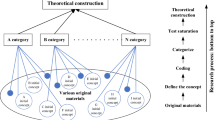Abstract
Although the smart city literature is continuously increasing these last decades, there is still a need to better understand what make their essence and smartness. The aim of the study is to deepen the understanding of the business model logic of the metropolitan city’s smartization process. More specifically, the research investigates how the building blocks of business model drive the smartization of metropolitan cities. The study explores the case of Paris, the capital of France, which has undergone a deep process of smartization over the last 15 years. The Parisian model of a smart city is insightful in several ways. The building blocks were reconfigured based on the three waves of smartization – search for legitimacy, from ‘urban intelligent’ to ‘ingenious city’, and ‘creative & living city’. Paris revised the drivers of the business model building blocks to remain smart and keep on creating value. Paris relies on new technologies as tools to involve all citizens, to go beyond sustainability; and to combine urban intelligence, social inclusion, resilience and technological innovation.



Similar content being viewed by others
Notes
The authors found only one conference paper, by Arduin et al. (2016), that compared the smart city projects of Paris and Nice from the knowledge and decision perspective.
Mairie de Paris (2015). Paris Intelligente et Durable. Perspectives 2020 (et au-delà).
References
Abbate, T., Cesaroni, F., Cinici, M. C., & Villari, M. (2018). Business models for developing smart cities. A fuzzy set qualitative comparative analysis of an IoT platform. Technological Forecasting and Social Change, 142, 183–193. https://doi.org/10.1016/j.techfore.2018.07.031.
Albino, V., Berardi, U., & Dangelico, R. M. (2015). Smart cities: Definitions, dimensions, performance, and initiatives. Journal of Urban Technology, 22(1), 3–21.
Alkandari, A., Alnasheet, M., & Alshekhly, I. F. (2012). Smart cities: survey. Journal of Advanced Computer Science and Technology Research, 2(2), 79–90.
Angelidou, M. (2017). The role of smart city characteristics in the plans of fifteen cities. Journal of Urban Technology, 24(4), 3–28.
Arduin PE, Negre E, Rosenthal-Sabroux C (2016) Knowledge and decision for smart cities initiatives: cases of Paris and Nice. In 2nd IEEE International Conference on Industrial Informatics and Computer Systems (CIICS16), Sharjah, March 13–15.
Ben Letaifa, S. (2015). How to strategize SMART cities: revealing the SMART model. J Bus Res, 68(7), 1414–1419.
Bizer, C., Heath, T., & Berners-Lee, T. (2011). Linked data: the story so far. In Seth A (ed.), Semantic services, interoperability and web applications: emerging concepts. IGI Global, pp. 205–227
Caragliu, A., & Del Bo, C. F. (2018). Smart innovative cities: the impact of Smart City policies on urban innovation. Technological Forecasting and Social Change, 142, 373–383. https://doi.org/10.1016/j.techfore.2018.07.022.
Caragliu, A., Del Bo, C., & Nijkamp, P. (2011). Smart cities in Europe. J Urban Technol, 18(2), 65–82.
Corley, K. G., & Gioia, D. A. (2004). Identity ambiguity and change in the wake of a corporate spin-off. Administrative Science Quarterly, 49(2), 173–208.
Deloitte. (2018). The challenge of paying for smart cities projects. Deloitte Development LLC. https://www2.deloitte.com/content/dam/Deloitte/global/Documents/Public-Sector/gx-ps-the-challenge-of-paying-for-smart-cities-projects1.pdf. Accessed 20 January 2019.
Díaz-Díaz, R., Muñoz, L., & Pérez-González, D. (2017). Business model analysis of public services operating in the smart city ecosystem: the case of SmartSantander. Future Generation Computer Systems, 76, 198–214.
EIP-SCC. (2018). Explore, shape, deal. General assembly report. 27–28 June 2018. Bulgaria: Sofia https://eu-smartcities.eu/sites/default/files/2018-07/General%20Assembly%202018%20Full%20Report.pdf. Accessed 20 January 2019.
Giffinger, R., Fertner, C., Kramar, H., Meijers, E. (2007). City-ranking of European medium-sized cities. Cent. Reg. Sci. Vienna UT. 1-12. http://www.smartcity-ranking.eu/download/city_ranking_final.pdf. Accessed 20 January 2019.
Gioia, D. A., Corley, K. G., & Hamilton, A. L. (2013). Seeking qualitative rigor in inductive research: Notes on the Gioia methodology. Organizational Research Methods, 16(1), 15–31.
Giourka, P., Sanders, M. W., Angelakoglou, K., Pramangioulis, D., Nikolopoulos, N., Rakopoulos, D., et al. (2019). The Smart City business model canvas—A Smart City business modeling framework and practical tool. Energies, 12(24), 4798.
Harrison, C., Eckman, B., Hamilton, R., Hartswick, P., Kalagnanam, J., Paraszczak, J., & Williams, P. (2010). Foundations for smarter cities. IBM Journal of Research and Development, 54(4), 1–16.
Hollands, R. (2008). Will the real smart city please stand up? City, 12(3), 303–320.
IESE. (2018). IESE cities in motion index. https://media.iese.edu/research/pdfs/ST-0471-E.pdf. Accessed 20 January 2019.
Kitchin, R. (2015). Making sense of smart cities: Addressing present shortcomings. Cambridge Journal of Regions, Economy and Society, 8(1), 131–136.
Komninos, N., & Mora, L. (2018). Exploring the big picture of smart city research. Scienze Regionali, 17(1), 1–17.
Komninos, N. (2006). The architecture of intelligent cities. Integrating human, collective, and artificial intelligence to enhance knowledge and innovation. In 2nd International Conference on Intelligent Environments, Institution of Engineering and Technology, Athens, July 5–6.
Kummitha, R. K. R. (2019). Smart cities and entrepreneurship: An agenda for future research. Technological Forecasting and Social Change, 149, 119763.
Kuk, G., & Janssen, M. (2011). The business models and information architectures of smart cities. Journal of Urban Technology, 18(2), 39–52.
Lee, J. H., & Hancock, M. G. (2012). Toward a framework for smart cities: A comparison of Seoul, San Francisco and Amsterdam. Research Paper, Yonsei University and Stanford University.
Lee, J. H., Hancock, M. G., & Hu, M. C. (2014). Towards an effective framework for building smart cities: Lessons from Seoul and San Francisco. Technological Forecasting and Social Change, 89, 80–99.
Lee, J. H., Phaal, R., & Lee, S. H. (2013). An integrated service-device-technology roadmap for smart city development. Technological Forecasting and Social Change, 80(2), 286–306.
Lee, S. M., & Trimi, S. (2018). Innovation for creating a smart future. Journal of Innovation and Knowledge, 3(1), 1–8.
Mora, L., & Bolici, R. (2017). How to become a Smart City: Learning from Amsterdam. In A. Bisello, D. Vettorato, R. Stephens, & P. Elisei (Eds.), Smart and sustainable planning for cities and regions (pp. 251–266). Switzerland: Springer International Publishing.
Mora, L., Bolici, R., & Deakin, M. (2017). The first two decades of smart-city research: A bibliometric analysis. Journal of Urban Technology, 24(1), 3–27.
Mora, L., Deakin, M., & Reid, A. (2018). Strategic principles for smart city development: A multiple case study analysis of European best practices. Technological Forecasting and Social Change, 142, 70–97. https://doi.org/10.1016/j.techfore.2018.07.035.
Nam, T., Pardo, T. A. (2011). Conceptualizing smart city with dimensions of technology, people, and institutions. In 12th Annual International Digital Government Research Conference: Digital Government Innovation in Challenging Times, ACM, Maryland, June 12–15.
Nilssen, M. (2018). To the smart city and beyond? Developing a typology of smart urban innovation. Technological Forecasting and Social Change, 142, 98–104. https://doi.org/10.1016/j.techfore.2018.07.060.
Nylund, P. A., & Cohen, B. (2017). Collision density: Driving growth in urban entrepreneurial ecosystems. International Entrepreneurship and Management Journal, 13(3), 757–776.
Ooms, W., Caniëls, M. C., Roijakkers, N., & Cobben, D. (2020). Ecosystems for smart cities: Tracing the evolution of governance structures in a dutch smart city initiative. International Entrepreneurship and Management Journal. https://doi.org/10.1007/s11365-020-00640-7.
Paroutis, S., Bennett, M., & Heracleous, L. (2014). A strategic view on smart city technology: The case of IBM smarter cities during a recession. Technological Forecasting and Social Change, 89, 262–272.
Perätalo, S., & Ahokangas, P. (2018). Toward Smart City business models. Journal of Business Models, 6(2), 65–70.
Pratt, A. C., & Hutton, T. A. (2013). Reconceptualising the relationship between the creative economy and the city: Learning from the financial crisis. Cities, 33, 86–95.
Ravasi, D., & Stigliani, I. (2012). Product design: A review and research agenda for management studies. International Journal of Management Reviews, 14(4), 464–488.
Schaffers, H., Komninos, N., Pallot, M., Aguas, M., Almirall, E., Bakici, T., et al. (2012). Smart cities as innovation ecosystems sustained by the future internet. Technical Report.
Schiavone, F., Paolone, F., & Mancini, D. (2019). Business model innovation for urban smartization. Technological Forecasting and Social Change, 142, 210–219.
Schipper, R., & Silvius, A. (2018). Characteristics of smart sustainable city development: implications for project management. Smart Cities, 1(1), 75–97.
Scornavacca, E., Paolone, F., Za, S., & Martiniello, L. (2020). Investigating the entrepreneurial perspective in smart city studies. International Entrepreneurship and Management Journal. https://doi.org/10.1007/s11365-019-00630-4.
Timeus, K., Vinaixa, J., & Pardo-Bosch, F. (2020). Creating business models for smart cities: A practical framework. Public Management Review, 22, 726–745. https://doi.org/10.1080/14719037.2020.1718187.
United Nations. (2016). The World’s cities in 2016. https://www.un.org/en/development/desa/population/publications/pdf/urbanization/the_worlds_cities_in_2016_data_booklet.pdf. Accessed 20 January 2019.
Yin, R. K. (2003). Case study research: Design and methods. Thousand Oaks: SAGE Publications.
Zygiaris, S. (2013). Smart city reference model: Assisting planners to conceptualize the building of smart city innovation ecosystems. Journal of the Knowledge Economy, 4(2), 217–231.
Author information
Authors and Affiliations
Corresponding author
Additional information
Publisher’s note
Springer Nature remains neutral with regard to jurisdictional claims in published maps and institutional affiliations.
Appendix
Appendix
Rights and permissions
About this article
Cite this article
Khelladi, I., Castellano, S. & Kalisz, D. The smartization of metropolitan cities: the case of Paris. Int Entrep Manag J 16, 1301–1325 (2020). https://doi.org/10.1007/s11365-020-00691-w
Published:
Issue Date:
DOI: https://doi.org/10.1007/s11365-020-00691-w




